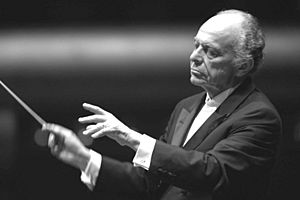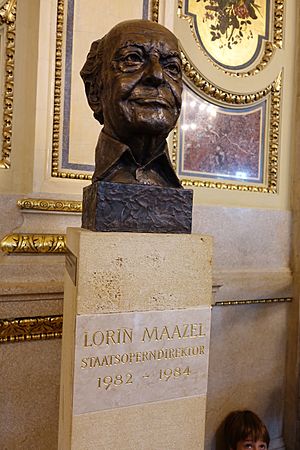Lorin Maazel facts for kids
Lorin Varencove Maazel (pronounced mah-ZEL, born March 6, 1930 – died July 13, 2014) was an American conductor, violinist, and composer. He started conducting at just eight years old. By 1953, he decided to make music his full-time career.
He became well-known in Europe by 1960. However, his career in the U.S. grew more slowly. Maazel led many famous orchestras. These included The Cleveland Orchestra, Orchestre National de France, Pittsburgh Symphony Orchestra, Bavarian Radio Symphony Orchestra, and the New York Philharmonic. He was known for his excellent baton technique. He also had a photographic memory for music scores. This meant he could remember every note perfectly. While he was strict in rehearsals, he became more relaxed as he got older.
Contents
Early Life and Amazing Talent
Lorin Maazel was born in France. His parents were Americans of Ukrainian Jewish background. His grandfather, Isaac Maazel, was a violinist in a famous opera orchestra. His mother, Marion Shulman Maazel, started the Pittsburgh Youth Symphony Orchestra.
Lorin was a true child prodigy. He had perfect pitch. This means he could identify any musical note just by hearing it. He had his first conducting lesson at age seven. He made his conducting debut at eight years old. He led an orchestra playing Schubert's "Unfinished" Symphony.
At age eleven, he guest-conducted the NBC Symphony Orchestra on the radio. When he was twelve, he toured the United States. He conducted many major orchestras. He also made his violin debut at fifteen. He studied music at the University of Pittsburgh.
Starting His Career
In the early 1950s, Maazel toured as a conductor. He led the Gershwin Concert Orchestra. This orchestra played music by George Gershwin. Famous soloists joined him on tour.
In 1960, Maazel made history. He was the first American to conduct at the Bayreuth Festspielhaus in Germany. This is a very important music festival. He was the main conductor for the Deutsche Oper Berlin from 1965 to 1971. He also led the Radio-Symphonie-Orchester (RSO) Berlin from 1964 to 1975.
Leading The Cleveland Orchestra
Lorin Maazel first conducted in Cleveland when he was 13. This was in 1943. He led pieces by Wagner and Schubert. He conducted the NBC Symphony and New York Philharmonic before this.
It took almost 30 years for Maazel to return. He became the music director of The Cleveland Orchestra in 1972. He took over from George Szell. Some critics worried about his emotional style. But he got support from other famous conductors. He also got a recording deal.
Maazel wanted to help young students. He started new music education programs. He planned a yearly concert for schoolchildren. The first one was in 1973. Over 5,000 people attended. It was a big success for his first season.
The orchestra also started recording again. They recorded Prokofiev’s Romeo and Juliet. They also began international tours. They visited Australia, New Zealand, and Japan. Maazel led them on tours to South and Central America too. He conducted their first opera recording, Gershwin’s Porgy and Bess.
Maazel's time in Cleveland ended in 1982. He conducted fewer concerts in his last season. His final performance in Cleveland was Verdi’s Requiem. He also took this piece on tour.
Later Years and Achievements
In 1977, Maazel became music director of the Orchestre National de France. He held this job until 1991. From 1982 to 1984, he worked at the Vienna State Opera. He was the general manager and main conductor there.
Maazel also conducted the famous Vienna New Year's Concert. This is a televised event. He led it every year from 1980 to 1986. He returned to conduct it four more times.
From 1984 to 1996, Maazel worked with the Pittsburgh Symphony Orchestra. He was their music director for part of that time. From 1993 to 2002, he led the Bavarian Radio Symphony Orchestra in Munich.
In 2000, Maazel guest-conducted the New York Philharmonic. The musicians liked him a lot. This led to him becoming their music director in 2002. He led the New York Philharmonic on a special visit to Pyongyang, North Korea in 2008. They played both the North Korean and U.S. national anthems. They also performed Dvořák's New World Symphony and other pieces. Maazel left the New York Philharmonic in 2009.
He also led the Orquestra de la Comunitat Valenciana in Spain. His last concert there was on his 81st birthday. He conducted his only opera, 1984. In 2010, he was named chief conductor of the Munich Philharmonic. However, he resigned in 2014 due to health issues.
Maazel conducted music for three opera films. These included Don Giovanni and Carmen. He also wrote his own opera, 1984. He created a shorter version of Wagner's Ring Cycle. It was called The 'Ring' Without Words. He recorded it with the Berlin Philharmonic.
Maazel made over 300 recordings. These included works by famous composers like Beethoven and Mahler. He won 10 Grand Prix du Disque awards for his recordings.
Death
Lorin Maazel passed away on July 13, 2014. He died at his home in Virginia. He had complications from pneumonia. He was survived by his wife, Dietlinde Turban Maazel, and his children.
Honors
Maazel received many honors. He was a Commander of the Légion d'honneur from France. He also received the Bundesverdienstkreuz from Germany. In 2013, he became an honorary member of the Vienna State Opera. He also received a high honor from Austria.
He won the Italian Premio Abbiati award. He was an Honorary Life Member of the Israel Philharmonic. He was also named a Kentucky Colonel.
See also
 In Spanish: Lorin Maazel para niños
In Spanish: Lorin Maazel para niños
 | Selma Burke |
 | Pauline Powell Burns |
 | Frederick J. Brown |
 | Robert Blackburn |



